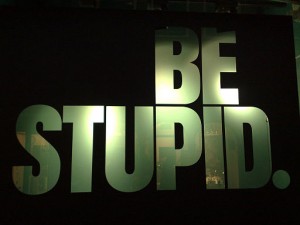
Even though I often think of myself as just an author or your average, run-of-the-mill person, as a writer who self publishes, I’m a business, too. And it’s not a sound business strategy simply to root for other people’s stupidity.
I say this because I read an interesting opinion piece on Salon the other day. The author suggested that self-published authors should root for Hachette to win the Hachette-Amazon dispute. Her basic argument was that Hachette is fighting to keep high prices for ebooks and this is good for indie authors, because if Hachette and other publishers brought their prices down, indie authors would be hurt.
“As irksome as it may be for self-published authors to acknowledge, it’s in their best interests that traditional publishers like Hachette be allowed keep the prices of their e-books high,” Laura Miller writes in her piece.
She’s right that when big publishers lower their prices, it crowds the market at the lower price point. However, she’s wrong that rooting for publishers to take the stupid strategy of trying to keep prices artificially high is helpful.
Lowering the price of books to nothing devalues books. But, readers aren’t stupid. They know the bulk of the cost of the ebook is the intellectual work. There is no paper, ink, or printing and shipping cost. You could say there’s the storage space (on a server), but that’s minimal. There’s also a transfer fee (which Amazon charges authors). So, telling readers they need to pay for $14.99 or more for an ebook is what Judge Judy would call, “peeing on my leg and telling me it’s raining.” Instinctively, readers know they’re being taken advantage of. Sadly, libraries don’t have an Amazon to fight for lower prices for them (unlike regular customers) and they sometimes pay $40-$100 per ebook.
While Amazon is fighting to knock prices down for customers, the fight isn’t to get to zero (no one profits from that). The question is about what is a reasonable price. Yes, publishers have more overhead than indies. They’re going to charge more. The real battle is over how much more. This is a battle because Amazon and Hachette appear to be battling over the cost, with Amazon wanting lower costs and to keep more of the money (interestingly, this article suggests that had publishers simply paid authors appropriate ebook royalties, rather than lowballing, Hachette wouldn’t be having this battle*).
Encouraging Hachette to take the fool move is something indies can do, but I’d rather not rely on Hachette (or anyone else, for that matter) making poor decisions for me to succeed. I think I’d rather rely on producing a quality product that readers enjoy. Because, in my opinion, rooting for other people’s stupidity to prevail isn’t a sound business strategy.
Alright folks. That’s it for me today. Have a lovely Thursday.
* This is the quote I’m referring to from that article: “‘Look at Harper’s own numbers,’ DeFiore wrote. ‘$27.99 hardcover generates $5.67 profit to publisher and $4.20 royalty to author. $14.99 agency priced e-book generates $7.87 profit to publisher and $2.62 royalty to author.’ … By leaving royalty rates where they are, publishers have left their nice digital margins hanging out there for everyone to see. And when Amazon sees someone else’s healthy profits, it’s like a dog smelling a steak. As Jeff Bezos has said, ‘Your margin is my opportunity.’ What I suspect is happening right now is that Amazon is telling Hachette that they want some of that margin. If Hachette had spread some of those digital profits to authors in the first place, it would not be vulnerable to this tactic.”
Good post, RJ. I agree with your practical assessment 🙂 And seriously, the whole Hach/AMZ kerfuffle is just more bizarro theater in this strange land we call publishing. Entertaining, though.
DV, completely agree. The publishing landscape lately has felt like bizarro theater. Let’s hope things settle down a bit.
Heh, yeah. I read that on TPV and you’re right, readers know costs are lower on eBooks for publishers so it is just a dumb idea to have ridiculously high prices. The one that gets me is when the costly-to-produce print book is the same price or even cheaper than the eBook, lol.
Oh, I’ve seen that, too, Dale. Awhile back the paperback of the novel our group selected for book club was cheaper than the ebook for some reason, and one of the ladies bought the paperback. But it’s always so odd when that happens.
“I’d rather not rely on Hachette (or anyone else, for that matter) making poor decisions for me to succeed. I think I’d rather rely on producing a quality product that readers enjoy.” –
Very bottomline commonsense, thanks RJ 🙂
I’m glad you think so, Felipe. I love common sense.